Abstract
Androgen receptor (AR) is a nuclear transcription factor that binds male sex steroids and mediates the biological effects of these hormones to the target cells, such as the epithelial cells of the prostate gland, by activating transcription of androgen-dependent genes. Withdrawal of androgens or the peripheral blockade of androgen action remain the critical therapeutic options for the treatment of advanced prostate cancer. However, after initial regression, many prostate cancers become hormone refractory and progress further with eventual fatal outcome. Understanding the mechanisms of tumor progression and endocrine therapy failure is an important goal. A large number of different molecular mechanisms may be responsible for development of hormone-refractory recurrent tumors. Many of these involve the AR gene and its complex downstream signaling pathways. The role of AR mutations and altered transactivational properties of the receptor have received the most attention as causative factors for progression. However, other mechanisms, such as AR gene amplification and overexpression or increased local bioconversion of androgens, may contribute to the development of progression by mechanisms that involve androgen-dependent cell growth. Here we review the role of the AR gene and its putative downstream effector pathways during human prostate cancer progression and endocrine therapy failure.
Full text
PDF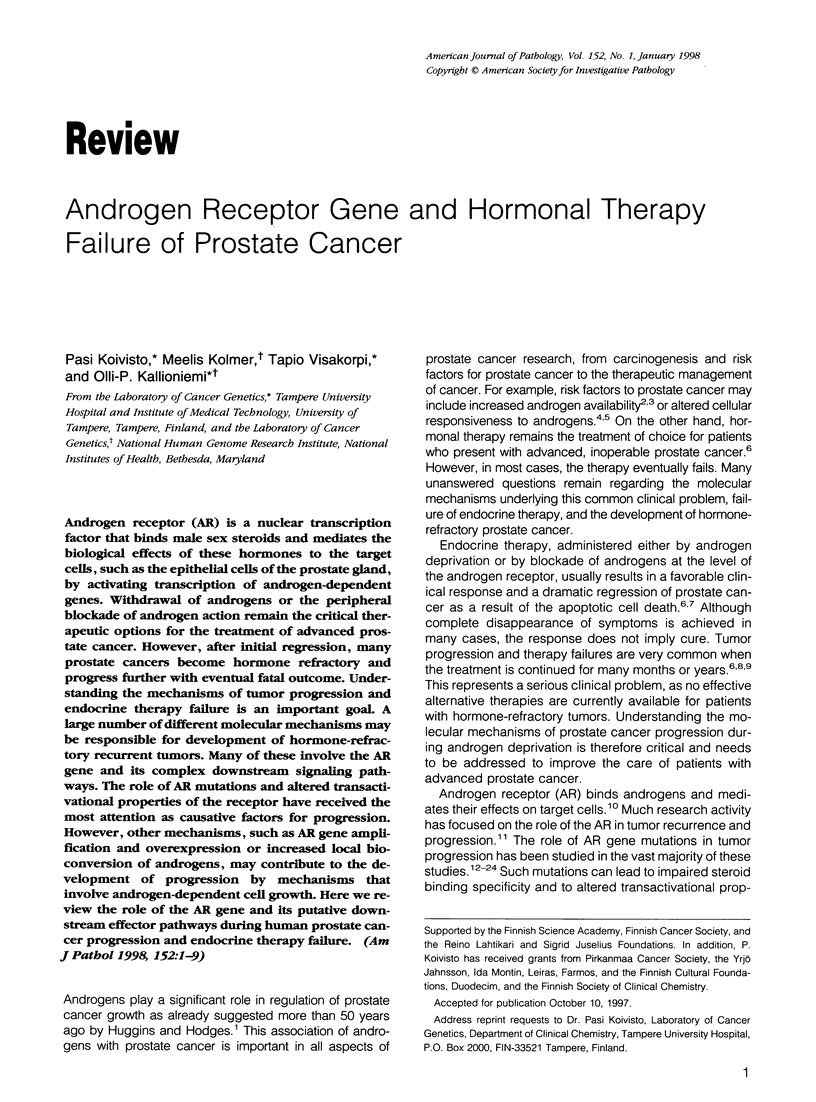
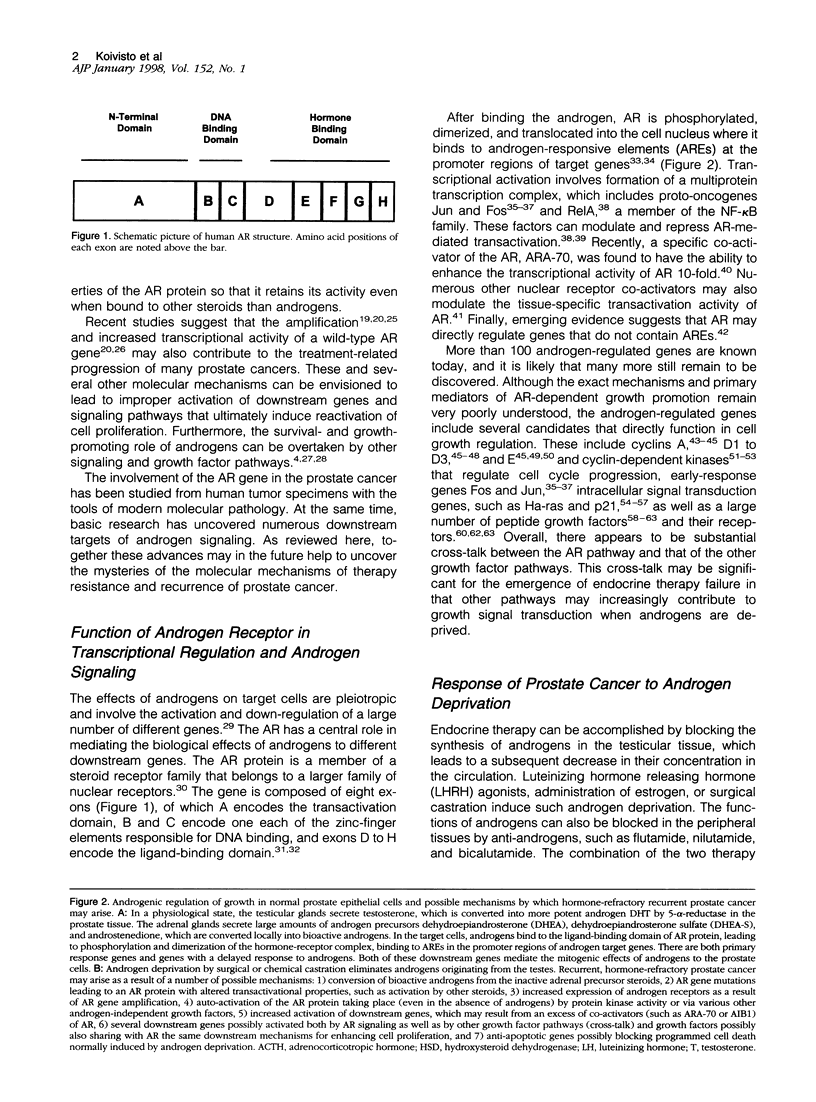
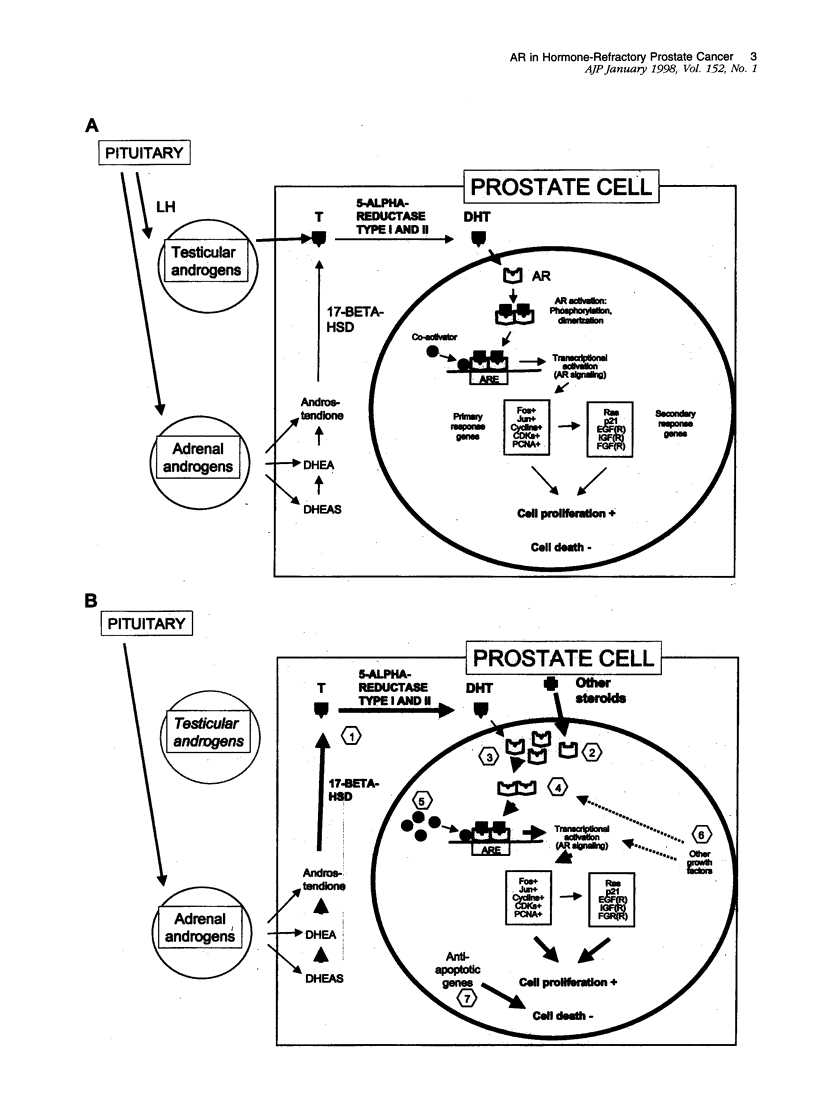
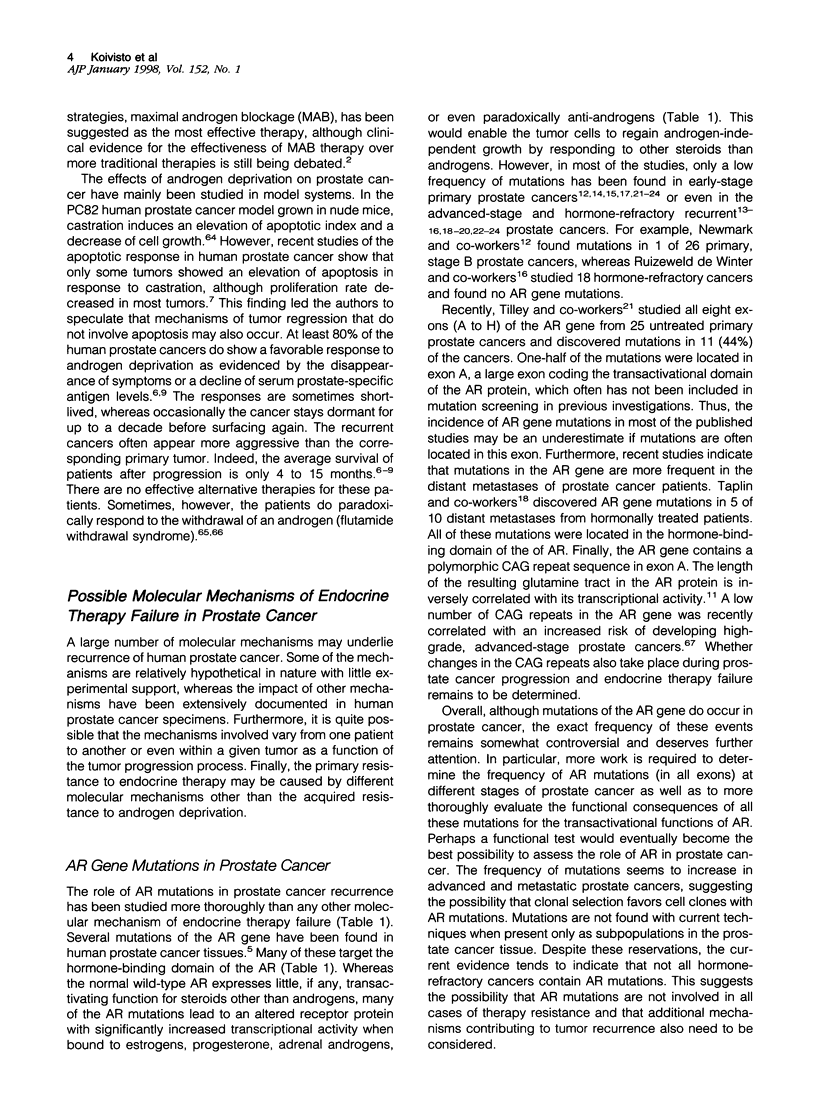
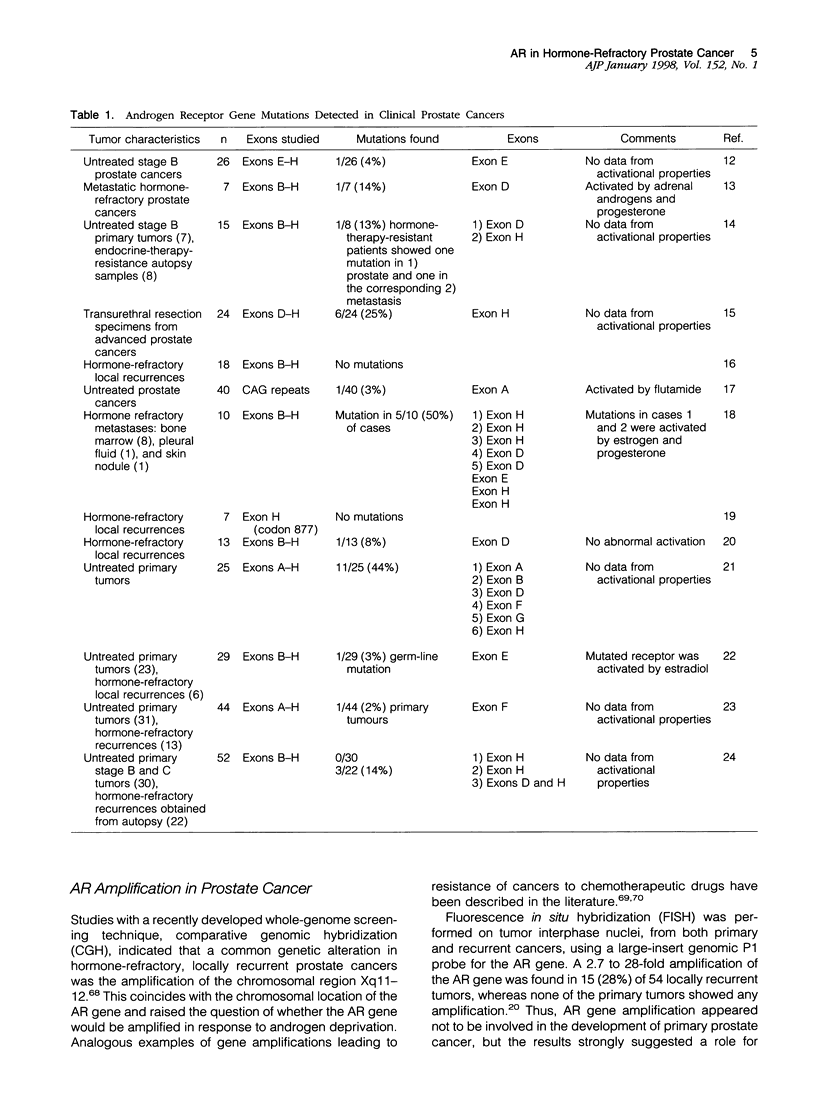
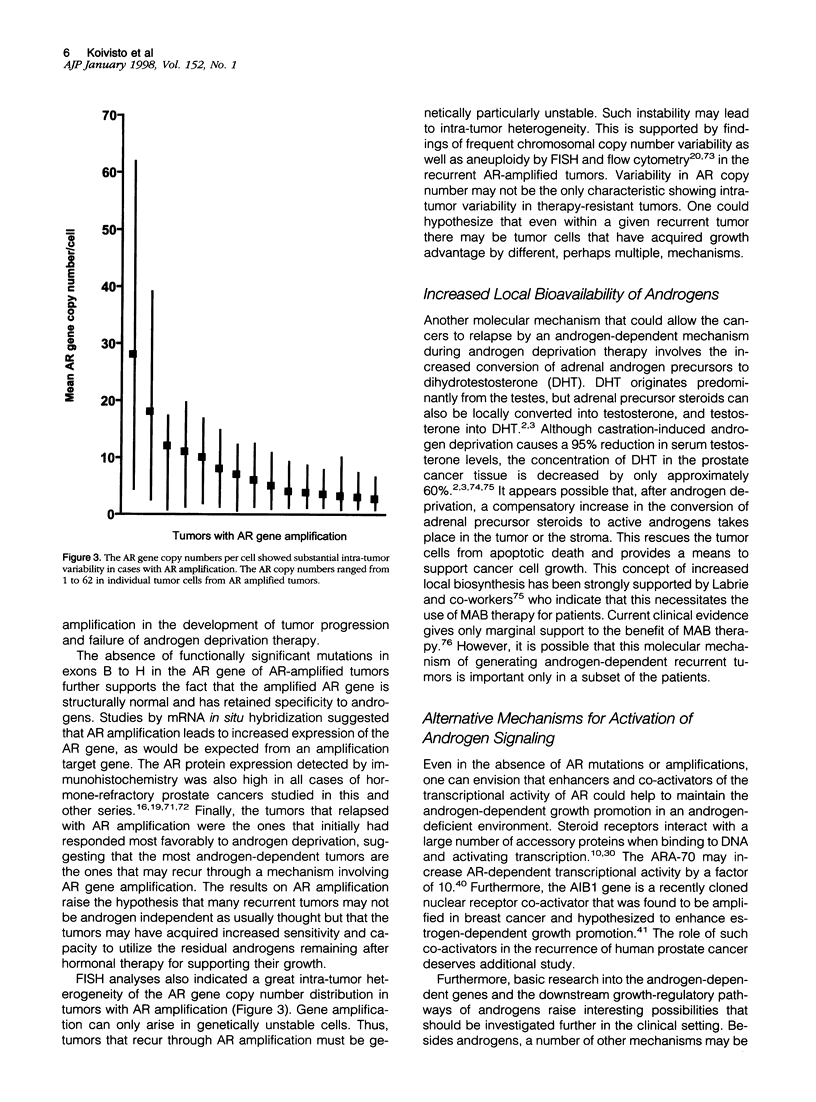
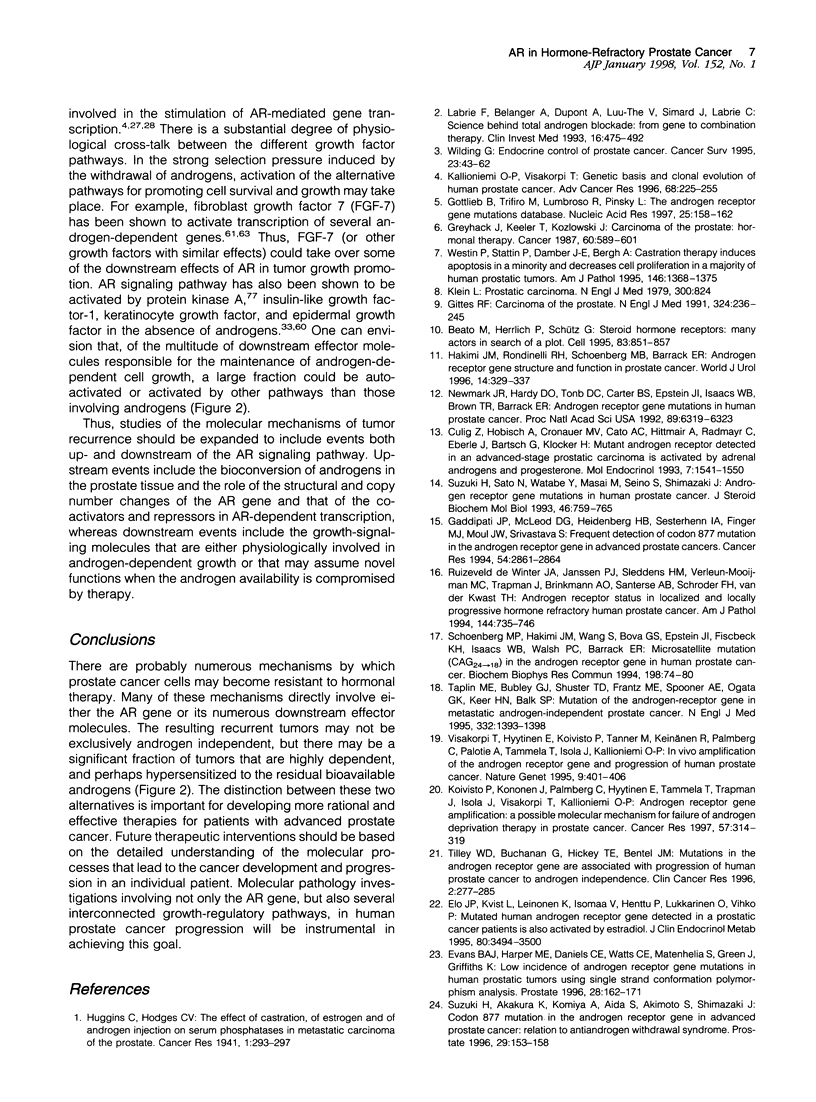
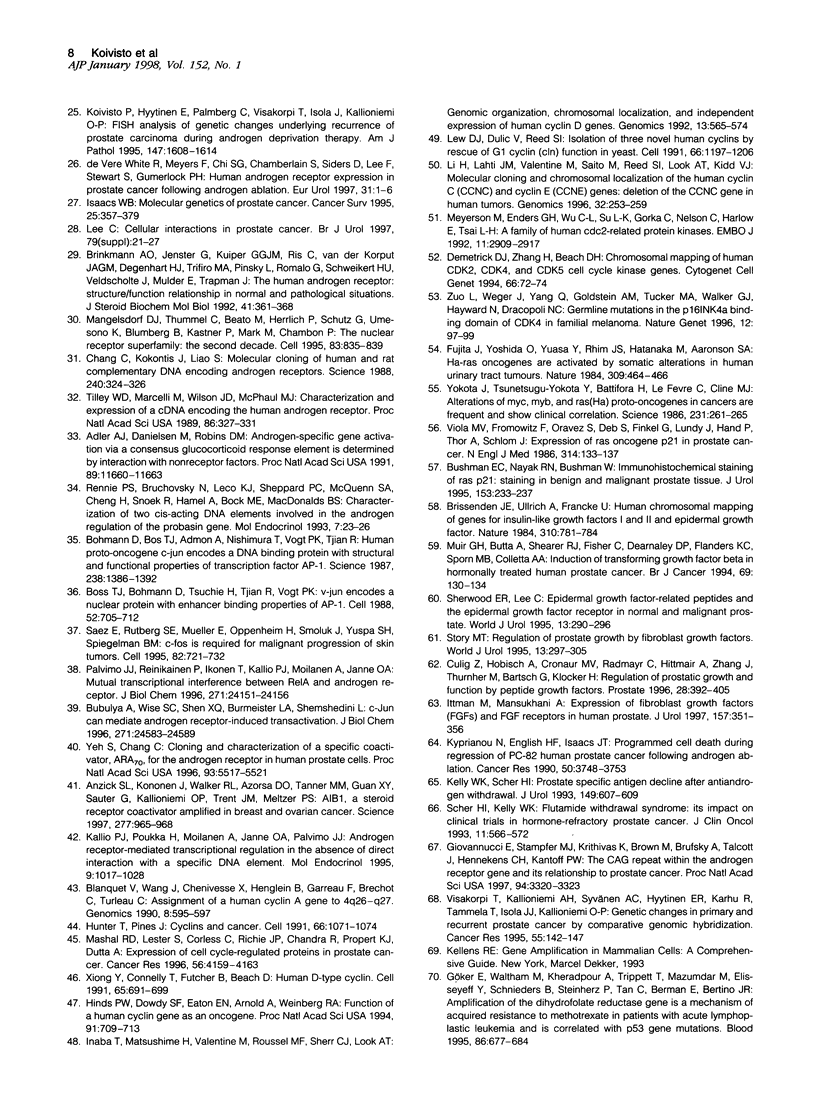
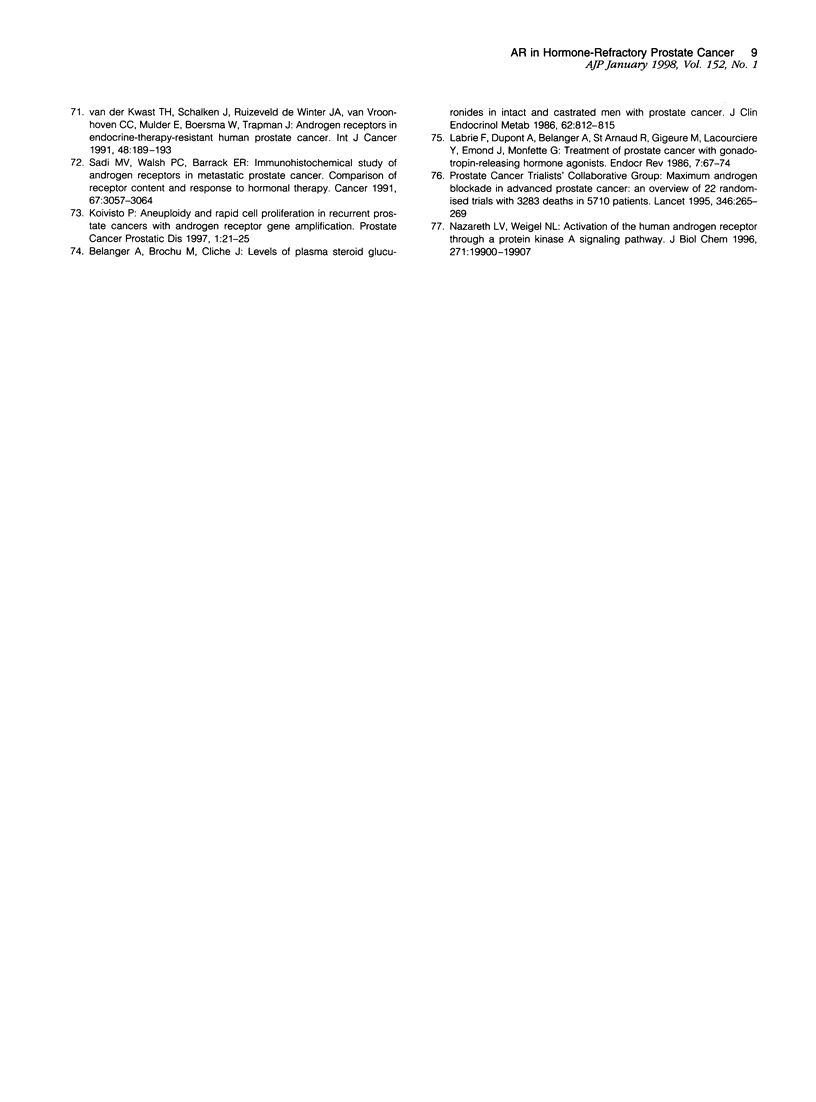
Selected References
These references are in PubMed. This may not be the complete list of references from this article.
- Adler A. J., Danielsen M., Robins D. M. Androgen-specific gene activation via a consensus glucocorticoid response element is determined by interaction with nonreceptor factors. Proc Natl Acad Sci U S A. 1992 Dec 15;89(24):11660–11663. doi: 10.1073/pnas.89.24.11660. [DOI] [PMC free article] [PubMed] [Google Scholar]
- Anzick S. L., Kononen J., Walker R. L., Azorsa D. O., Tanner M. M., Guan X. Y., Sauter G., Kallioniemi O. P., Trent J. M., Meltzer P. S. AIB1, a steroid receptor coactivator amplified in breast and ovarian cancer. Science. 1997 Aug 15;277(5328):965–968. doi: 10.1126/science.277.5328.965. [DOI] [PubMed] [Google Scholar]
- Beato M., Herrlich P., Schütz G. Steroid hormone receptors: many actors in search of a plot. Cell. 1995 Dec 15;83(6):851–857. doi: 10.1016/0092-8674(95)90201-5. [DOI] [PubMed] [Google Scholar]
- Blanquet V., Wang J. A., Chenivesse X., Henglein B., Garreau F., Bréchot C., Turleau C. Assignment of a human cyclin A gene to 4q26-q27. Genomics. 1990 Nov;8(3):595–597. doi: 10.1016/0888-7543(90)90052-v. [DOI] [PubMed] [Google Scholar]
- Bohmann D., Bos T. J., Admon A., Nishimura T., Vogt P. K., Tjian R. Human proto-oncogene c-jun encodes a DNA binding protein with structural and functional properties of transcription factor AP-1. Science. 1987 Dec 4;238(4832):1386–1392. doi: 10.1126/science.2825349. [DOI] [PubMed] [Google Scholar]
- Bos T. J., Bohmann D., Tsuchie H., Tjian R., Vogt P. K. v-jun encodes a nuclear protein with enhancer binding properties of AP-1. Cell. 1988 Mar 11;52(5):705–712. doi: 10.1016/0092-8674(88)90408-4. [DOI] [PubMed] [Google Scholar]
- Brinkmann A. O., Jenster G., Kuiper G. G., Ris C., van Laar J. H., van der Korput J. A., Degenhart H. J., Trifiro M. A., Pinsky L., Romalo G. The human androgen receptor: structure/function relationship in normal and pathological situations. J Steroid Biochem Mol Biol. 1992 Mar;41(3-8):361–368. doi: 10.1016/0960-0760(92)90362-m. [DOI] [PubMed] [Google Scholar]
- Brissenden J. E., Ullrich A., Francke U. Human chromosomal mapping of genes for insulin-like growth factors I and II and epidermal growth factor. 1984 Aug 30-Sep 5Nature. 310(5980):781–784. doi: 10.1038/310781a0. [DOI] [PubMed] [Google Scholar]
- Bubulya A., Wise S. C., Shen X. Q., Burmeister L. A., Shemshedini L. c-Jun can mediate androgen receptor-induced transactivation. J Biol Chem. 1996 Oct 4;271(40):24583–24589. doi: 10.1074/jbc.271.40.24583. [DOI] [PubMed] [Google Scholar]
- Bushman E. C., Nayak R. N., Bushman W. Immunohistochemical staining of ras p21: staining in benign and malignant prostate tissue. J Urol. 1995 Jan;153(1):233–237. doi: 10.1097/00005392-199501000-00083. [DOI] [PubMed] [Google Scholar]
- Bélanger A., Brochu M., Cliche J. Levels of plasma steroid glucuronides in intact and castrated men with prostatic cancer. J Clin Endocrinol Metab. 1986 May;62(5):812–815. doi: 10.1210/jcem-62-5-812. [DOI] [PubMed] [Google Scholar]
- Chang C. S., Kokontis J., Liao S. T. Molecular cloning of human and rat complementary DNA encoding androgen receptors. Science. 1988 Apr 15;240(4850):324–326. doi: 10.1126/science.3353726. [DOI] [PubMed] [Google Scholar]
- Culig Z., Hobisch A., Cronauer M. V., Cato A. C., Hittmair A., Radmayr C., Eberle J., Bartsch G., Klocker H. Mutant androgen receptor detected in an advanced-stage prostatic carcinoma is activated by adrenal androgens and progesterone. Mol Endocrinol. 1993 Dec;7(12):1541–1550. doi: 10.1210/mend.7.12.8145761. [DOI] [PubMed] [Google Scholar]
- Culig Z., Hobisch A., Cronauer M. V., Radmayr C., Hittmair A., Zhang J., Thurnher M., Bartsch G., Klocker H. Regulation of prostatic growth and function by peptide growth factors. Prostate. 1996 Jun;28(6):392–405. doi: 10.1002/(SICI)1097-0045(199606)28:6<392::AID-PROS9>3.0.CO;2-C. [DOI] [PubMed] [Google Scholar]
- Demetrick D. J., Zhang H., Beach D. H. Chromosomal mapping of human CDK2, CDK4, and CDK5 cell cycle kinase genes. Cytogenet Cell Genet. 1994;66(1):72–74. doi: 10.1159/000133669. [DOI] [PubMed] [Google Scholar]
- Elo J. P., Kvist L., Leinonen K., Isomaa V., Henttu P., Lukkarinen O., Vihko P. Mutated human androgen receptor gene detected in a prostatic cancer patient is also activated by estradiol. J Clin Endocrinol Metab. 1995 Dec;80(12):3494–3500. doi: 10.1210/jcem.80.12.8530589. [DOI] [PubMed] [Google Scholar]
- Evans B. A., Harper M. E., Daniells C. E., Watts C. E., Matenhelia S., Green J., Griffiths K. Low incidence of androgen receptor gene mutations in human prostatic tumors using single strand conformation polymorphism analysis. Prostate. 1996 Mar;28(3):162–171. doi: 10.1002/(SICI)1097-0045(199603)28:3<162::AID-PROS3>3.0.CO;2-H. [DOI] [PubMed] [Google Scholar]
- Fujita J., Yoshida O., Yuasa Y., Rhim J. S., Hatanaka M., Aaronson S. A. Ha-ras oncogenes are activated by somatic alterations in human urinary tract tumours. 1984 May 31-Jun 6Nature. 309(5967):464–466. doi: 10.1038/309464a0. [DOI] [PubMed] [Google Scholar]
- Gaddipati J. P., McLeod D. G., Heidenberg H. B., Sesterhenn I. A., Finger M. J., Moul J. W., Srivastava S. Frequent detection of codon 877 mutation in the androgen receptor gene in advanced prostate cancers. Cancer Res. 1994 Jun 1;54(11):2861–2864. [PubMed] [Google Scholar]
- Giovannucci E., Stampfer M. J., Krithivas K., Brown M., Dahl D., Brufsky A., Talcott J., Hennekens C. H., Kantoff P. W. The CAG repeat within the androgen receptor gene and its relationship to prostate cancer. Proc Natl Acad Sci U S A. 1997 Apr 1;94(7):3320–3323. doi: 10.1073/pnas.94.7.3320. [DOI] [PMC free article] [PubMed] [Google Scholar]
- Gittes R. F. Carcinoma of the prostate. N Engl J Med. 1991 Jan 24;324(4):236–245. doi: 10.1056/NEJM199101243240406. [DOI] [PubMed] [Google Scholar]
- Gottlieb B., Trifiro M., Lumbroso R., Pinsky L. The androgen receptor gene mutations database. Nucleic Acids Res. 1997 Jan 1;25(1):158–162. doi: 10.1093/nar/25.1.158. [DOI] [PMC free article] [PubMed] [Google Scholar]
- Grayhack J. T., Keeler T. C., Kozlowski J. M. Carcinoma of the prostate. Hormonal therapy. Cancer. 1987 Aug 1;60(3 Suppl):589–601. doi: 10.1002/1097-0142(19870801)60:3+<589::aid-cncr2820601526>3.0.co;2-r. [DOI] [PubMed] [Google Scholar]
- Göker E., Waltham M., Kheradpour A., Trippett T., Mazumdar M., Elisseyeff Y., Schnieders B., Steinherz P., Tan C., Berman E. Amplification of the dihydrofolate reductase gene is a mechanism of acquired resistance to methotrexate in patients with acute lymphoblastic leukemia and is correlated with p53 gene mutations. Blood. 1995 Jul 15;86(2):677–684. [PubMed] [Google Scholar]
- Hakimi J. M., Rondinelli R. H., Schoenberg M. P., Barrack E. R. Androgen-receptor gene structure and function in prostate cancer. World J Urol. 1996;14(5):329–337. doi: 10.1007/BF00184606. [DOI] [PubMed] [Google Scholar]
- Hinds P. W., Dowdy S. F., Eaton E. N., Arnold A., Weinberg R. A. Function of a human cyclin gene as an oncogene. Proc Natl Acad Sci U S A. 1994 Jan 18;91(2):709–713. doi: 10.1073/pnas.91.2.709. [DOI] [PMC free article] [PubMed] [Google Scholar]
- Hunter T., Pines J. Cyclins and cancer. Cell. 1991 Sep 20;66(6):1071–1074. doi: 10.1016/0092-8674(91)90028-w. [DOI] [PubMed] [Google Scholar]
- Inaba T., Matsushime H., Valentine M., Roussel M. F., Sherr C. J., Look A. T. Genomic organization, chromosomal localization, and independent expression of human cyclin D genes. Genomics. 1992 Jul;13(3):565–574. doi: 10.1016/0888-7543(92)90126-d. [DOI] [PubMed] [Google Scholar]
- Isaacs W. B. Molecular genetics of prostate cancer. Cancer Surv. 1995;25:357–379. [PubMed] [Google Scholar]
- Ittman M., Mansukhani A. Expression of fibroblast growth factors (FGFs) and FGF receptors in human prostate. J Urol. 1997 Jan;157(1):351–356. [PubMed] [Google Scholar]
- Kallio P. J., Poukka H., Moilanen A., Jänne O. A., Palvimo J. J. Androgen receptor-mediated transcriptional regulation in the absence of direct interaction with a specific DNA element. Mol Endocrinol. 1995 Aug;9(8):1017–1028. doi: 10.1210/mend.9.8.7476976. [DOI] [PubMed] [Google Scholar]
- Kallioniemi O. P., Visakorpi T. Genetic basis and clonal evolution of human prostate cancer. Adv Cancer Res. 1996;68:225–255. doi: 10.1016/s0065-230x(08)60355-3. [DOI] [PubMed] [Google Scholar]
- Kelly W. K., Scher H. I. Prostate specific antigen decline after antiandrogen withdrawal: the flutamide withdrawal syndrome. J Urol. 1993 Mar;149(3):607–609. doi: 10.1016/s0022-5347(17)36163-3. [DOI] [PubMed] [Google Scholar]
- Klein L. A. Prostatic carcinoma. N Engl J Med. 1979 Apr 12;300(15):824–833. doi: 10.1056/NEJM197904123001504. [DOI] [PubMed] [Google Scholar]
- Koivisto P. Aneuploidy and rapid cell proliferation in recurrent prostate cancers with androgen receptor gene amplification. Prostate Cancer Prostatic Dis. 1997 Sep;1(1):21–25. doi: 10.1038/sj.pcan.4500200. [DOI] [PubMed] [Google Scholar]
- Koivisto P., Hyytinen E., Palmberg C., Tammela T., Visakorpi T., Isola J., Kallioniemi O. P. Analysis of genetic changes underlying local recurrence of prostate carcinoma during androgen deprivation therapy. Am J Pathol. 1995 Dec;147(6):1608–1614. [PMC free article] [PubMed] [Google Scholar]
- Koivisto P., Kononen J., Palmberg C., Tammela T., Hyytinen E., Isola J., Trapman J., Cleutjens K., Noordzij A., Visakorpi T. Androgen receptor gene amplification: a possible molecular mechanism for androgen deprivation therapy failure in prostate cancer. Cancer Res. 1997 Jan 15;57(2):314–319. [PubMed] [Google Scholar]
- Kyprianou N., English H. F., Isaacs J. T. Programmed cell death during regression of PC-82 human prostate cancer following androgen ablation. Cancer Res. 1990 Jun 15;50(12):3748–3753. [PubMed] [Google Scholar]
- Labrie F., Bélanger A., Dupont A., Luu-The V., Simard J., Labrie C. Science behind total androgen blockade: from gene to combination therapy. Clin Invest Med. 1993 Dec;16(6):475–492. [PubMed] [Google Scholar]
- Labrie F., Dupont A., Bélanger A., St-Arnaud R., Giguère M., Lacourcière Y., Emond J., Monfette G. Treatment of prostate cancer with gonadotropin-releasing hormone agonists. Endocr Rev. 1986 Feb;7(1):67–74. doi: 10.1210/edrv-7-1-67. [DOI] [PubMed] [Google Scholar]
- Lee C. Cellular interactions in prostate cancer. Br J Urol. 1997 Mar;79 (Suppl 1):21–27. doi: 10.1111/j.1464-410x.1997.tb00797.x. [DOI] [PubMed] [Google Scholar]
- Lew D. J., Dulić V., Reed S. I. Isolation of three novel human cyclins by rescue of G1 cyclin (Cln) function in yeast. Cell. 1991 Sep 20;66(6):1197–1206. doi: 10.1016/0092-8674(91)90042-w. [DOI] [PubMed] [Google Scholar]
- Li H., Lahti J. M., Valentine M., Saito M., Reed S. I., Look A. T., Kidd V. J. Molecular cloning and chromosomal localization of the human cyclin C (CCNC) and cyclin E (CCNE) genes: deletion of the CCNC gene in human tumors. Genomics. 1996 Mar 1;32(2):253–259. doi: 10.1006/geno.1996.0112. [DOI] [PubMed] [Google Scholar]
- Mangelsdorf D. J., Thummel C., Beato M., Herrlich P., Schütz G., Umesono K., Blumberg B., Kastner P., Mark M., Chambon P. The nuclear receptor superfamily: the second decade. Cell. 1995 Dec 15;83(6):835–839. doi: 10.1016/0092-8674(95)90199-x. [DOI] [PMC free article] [PubMed] [Google Scholar]
- Mashal R. D., Lester S., Corless C., Richie J. P., Chandra R., Propert K. J., Dutta A. Expression of cell cycle-regulated proteins in prostate cancer. Cancer Res. 1996 Sep 15;56(18):4159–4163. [PubMed] [Google Scholar]
- Meyerson M., Enders G. H., Wu C. L., Su L. K., Gorka C., Nelson C., Harlow E., Tsai L. H. A family of human cdc2-related protein kinases. EMBO J. 1992 Aug;11(8):2909–2917. doi: 10.1002/j.1460-2075.1992.tb05360.x. [DOI] [PMC free article] [PubMed] [Google Scholar]
- Muir G. H., Butta A., Shearer R. J., Fisher C., Dearnaley D. P., Flanders K. C., Sporn M. B., Colletta A. A. Induction of transforming growth factor beta in hormonally treated human prostate cancer. Br J Cancer. 1994 Jan;69(1):130–134. doi: 10.1038/bjc.1994.21. [DOI] [PMC free article] [PubMed] [Google Scholar]
- Nazareth L. V., Weigel N. L. Activation of the human androgen receptor through a protein kinase A signaling pathway. J Biol Chem. 1996 Aug 16;271(33):19900–19907. doi: 10.1074/jbc.271.33.19900. [DOI] [PubMed] [Google Scholar]
- Newmark J. R., Hardy D. O., Tonb D. C., Carter B. S., Epstein J. I., Isaacs W. B., Brown T. R., Barrack E. R. Androgen receptor gene mutations in human prostate cancer. Proc Natl Acad Sci U S A. 1992 Jul 15;89(14):6319–6323. doi: 10.1073/pnas.89.14.6319. [DOI] [PMC free article] [PubMed] [Google Scholar]
- Palvimo J. J., Reinikainen P., Ikonen T., Kallio P. J., Moilanen A., Jänne O. A. Mutual transcriptional interference between RelA and androgen receptor. J Biol Chem. 1996 Sep 27;271(39):24151–24156. doi: 10.1074/jbc.271.39.24151. [DOI] [PubMed] [Google Scholar]
- Rennie P. S., Bruchovsky N., Leco K. J., Sheppard P. C., McQueen S. A., Cheng H., Snoek R., Hamel A., Bock M. E., MacDonald B. S. Characterization of two cis-acting DNA elements involved in the androgen regulation of the probasin gene. Mol Endocrinol. 1993 Jan;7(1):23–36. doi: 10.1210/mend.7.1.8446105. [DOI] [PubMed] [Google Scholar]
- Ruizeveld de Winter J. A., Janssen P. J., Sleddens H. M., Verleun-Mooijman M. C., Trapman J., Brinkmann A. O., Santerse A. B., Schröder F. H., van der Kwast T. H. Androgen receptor status in localized and locally progressive hormone refractory human prostate cancer. Am J Pathol. 1994 Apr;144(4):735–746. [PMC free article] [PubMed] [Google Scholar]
- Sadi M. V., Walsh P. C., Barrack E. R. Immunohistochemical study of androgen receptors in metastatic prostate cancer. Comparison of receptor content and response to hormonal therapy. Cancer. 1991 Jun 15;67(12):3057–3064. doi: 10.1002/1097-0142(19910615)67:12<3057::aid-cncr2820671221>3.0.co;2-s. [DOI] [PubMed] [Google Scholar]
- Saez E., Rutberg S. E., Mueller E., Oppenheim H., Smoluk J., Yuspa S. H., Spiegelman B. M. c-fos is required for malignant progression of skin tumors. Cell. 1995 Sep 8;82(5):721–732. doi: 10.1016/0092-8674(95)90469-7. [DOI] [PubMed] [Google Scholar]
- Schoenberg M. P., Hakimi J. M., Wang S., Bova G. S., Epstein J. I., Fischbeck K. H., Isaacs W. B., Walsh P. C., Barrack E. R. Microsatellite mutation (CAG24-->18) in the androgen receptor gene in human prostate cancer. Biochem Biophys Res Commun. 1994 Jan 14;198(1):74–80. doi: 10.1006/bbrc.1994.1011. [DOI] [PubMed] [Google Scholar]
- Sherwood E. R., Lee C. Epidermal growth factor-related peptides and the epidermal growth factor receptor in normal and malignant prostate. World J Urol. 1995;13(5):290–296. doi: 10.1007/BF00185972. [DOI] [PubMed] [Google Scholar]
- Story M. T. Regulation of prostate growth by fibroblast growth factors. World J Urol. 1995;13(5):297–305. doi: 10.1007/BF00185973. [DOI] [PubMed] [Google Scholar]
- Suzuki H., Akakura K., Komiya A., Aida S., Akimoto S., Shimazaki J. Codon 877 mutation in the androgen receptor gene in advanced prostate cancer: relation to antiandrogen withdrawal syndrome. Prostate. 1996 Sep;29(3):153–158. doi: 10.1002/1097-0045(199609)29:3<153::aid-pros2990290303>3.0.co;2-5. [DOI] [PubMed] [Google Scholar]
- Suzuki H., Sato N., Watabe Y., Masai M., Seino S., Shimazaki J. Androgen receptor gene mutations in human prostate cancer. J Steroid Biochem Mol Biol. 1993 Dec;46(6):759–765. doi: 10.1016/0960-0760(93)90316-o. [DOI] [PubMed] [Google Scholar]
- Taplin M. E., Bubley G. J., Shuster T. D., Frantz M. E., Spooner A. E., Ogata G. K., Keer H. N., Balk S. P. Mutation of the androgen-receptor gene in metastatic androgen-independent prostate cancer. N Engl J Med. 1995 May 25;332(21):1393–1398. doi: 10.1056/NEJM199505253322101. [DOI] [PubMed] [Google Scholar]
- Tilley W. D., Buchanan G., Hickey T. E., Bentel J. M. Mutations in the androgen receptor gene are associated with progression of human prostate cancer to androgen independence. Clin Cancer Res. 1996 Feb;2(2):277–285. [PubMed] [Google Scholar]
- Tilley W. D., Marcelli M., Wilson J. D., McPhaul M. J. Characterization and expression of a cDNA encoding the human androgen receptor. Proc Natl Acad Sci U S A. 1989 Jan;86(1):327–331. doi: 10.1073/pnas.86.1.327. [DOI] [PMC free article] [PubMed] [Google Scholar]
- Viola M. V., Fromowitz F., Oravez S., Deb S., Finkel G., Lundy J., Hand P., Thor A., Schlom J. Expression of ras oncogene p21 in prostate cancer. N Engl J Med. 1986 Jan 16;314(3):133–137. doi: 10.1056/NEJM198601163140301. [DOI] [PubMed] [Google Scholar]
- Visakorpi T., Hyytinen E., Koivisto P., Tanner M., Keinänen R., Palmberg C., Palotie A., Tammela T., Isola J., Kallioniemi O. P. In vivo amplification of the androgen receptor gene and progression of human prostate cancer. Nat Genet. 1995 Apr;9(4):401–406. doi: 10.1038/ng0495-401. [DOI] [PubMed] [Google Scholar]
- Westin P., Stattin P., Damber J. E., Bergh A. Castration therapy rapidly induces apoptosis in a minority and decreases cell proliferation in a majority of human prostatic tumors. Am J Pathol. 1995 Jun;146(6):1368–1375. [PMC free article] [PubMed] [Google Scholar]
- Wilding G. Endocrine control of prostate cancer. Cancer Surv. 1995;23:43–62. [PubMed] [Google Scholar]
- Xiong Y., Connolly T., Futcher B., Beach D. Human D-type cyclin. Cell. 1991 May 17;65(4):691–699. doi: 10.1016/0092-8674(91)90100-d. [DOI] [PubMed] [Google Scholar]
- Yeh S., Chang C. Cloning and characterization of a specific coactivator, ARA70, for the androgen receptor in human prostate cells. Proc Natl Acad Sci U S A. 1996 May 28;93(11):5517–5521. doi: 10.1073/pnas.93.11.5517. [DOI] [PMC free article] [PubMed] [Google Scholar]
- Yokota J., Tsunetsugu-Yokota Y., Battifora H., Le Fevre C., Cline M. J. Alterations of myc, myb, and rasHa proto-oncogenes in cancers are frequent and show clinical correlation. Science. 1986 Jan 17;231(4735):261–265. doi: 10.1126/science.3941898. [DOI] [PubMed] [Google Scholar]
- Zuo L., Weger J., Yang Q., Goldstein A. M., Tucker M. A., Walker G. J., Hayward N., Dracopoli N. C. Germline mutations in the p16INK4a binding domain of CDK4 in familial melanoma. Nat Genet. 1996 Jan;12(1):97–99. doi: 10.1038/ng0196-97. [DOI] [PubMed] [Google Scholar]
- de Vere White R., Meyers F., Chi S. G., Chamberlain S., Siders D., Lee F., Stewart S., Gumerlock P. H. Human androgen receptor expression in prostate cancer following androgen ablation. Eur Urol. 1997;31(1):1–6. doi: 10.1159/000474409. [DOI] [PubMed] [Google Scholar]
- van der Kwast T. H., Schalken J., Ruizeveld de Winter J. A., van Vroonhoven C. C., Mulder E., Boersma W., Trapman J. Androgen receptors in endocrine-therapy-resistant human prostate cancer. Int J Cancer. 1991 May 10;48(2):189–193. doi: 10.1002/ijc.2910480206. [DOI] [PubMed] [Google Scholar]


